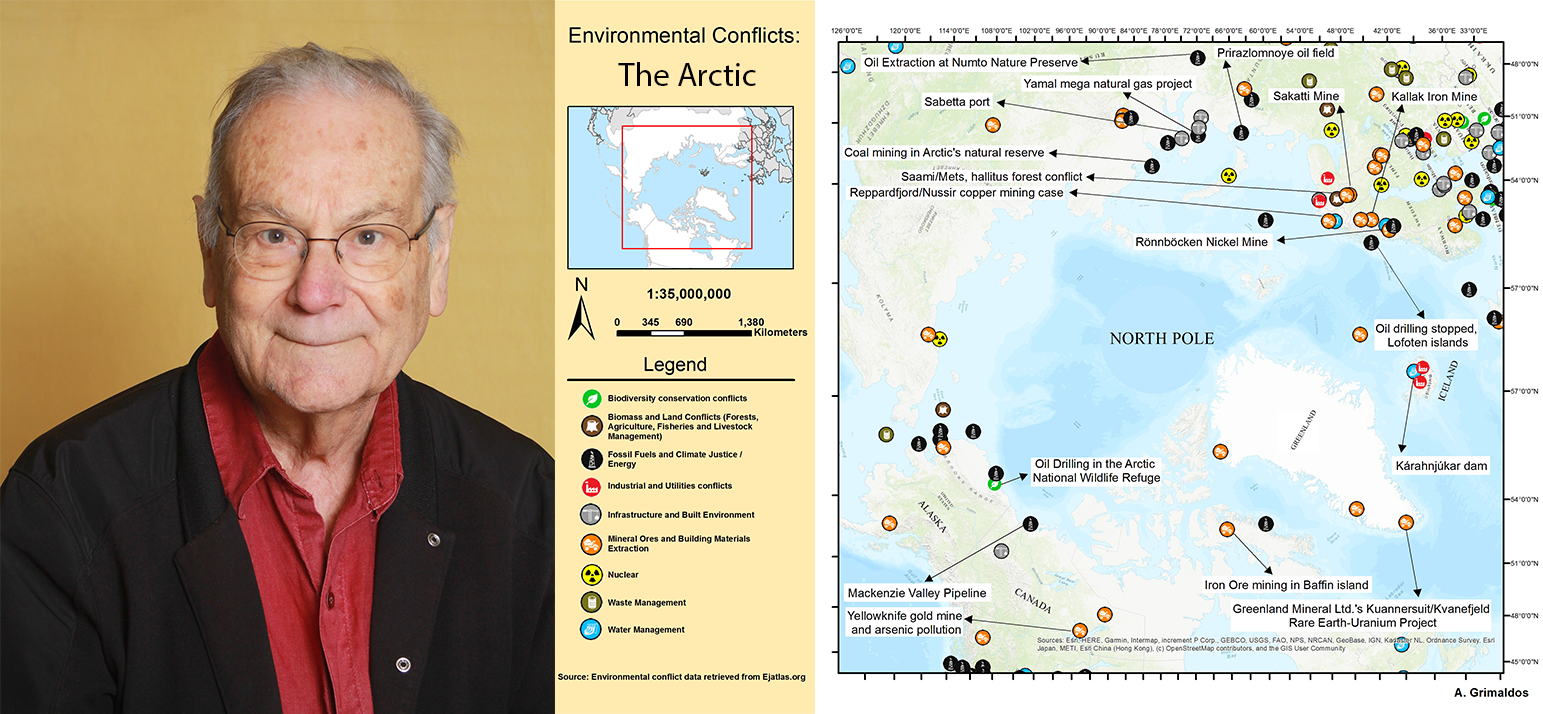Call for Participation: PhD Masterclass with 2023 Holberg Laureate Joan Martinez-Alier

The Holberg Prize is offering scholarships for five PhD candidates in the Nordic countries to participate in a Masterclass with Professor Joan Martinez-Alier on the topic "Political Ecology in the Arctic" on 7 June, 2023. The deadline for applications is 20 April 2023.
PhD candidates in the Nordic countries can now apply to participate in a Masterclass with Professor Joan Martinez-Alier, the 2023 Holberg Laureate. The event takes place during the Holberg Week in Bergen on Wednesday, 7 June, 2023, 10:00 a.m.– 12:00 a.m. Travel and accommodation expenses will be covered, and the participants are also invited to other events during the 2023 Holberg Week (6 – 9 June). The PhD Masterclass is open to the public, will be livestreamed, and video will remain online after the event.
Click here for information regarding the programme and to see the event.
"Political Ecology in the Arctic"
This is a masterclass showing how the study of social metabolism in Ecological Economics and Industrial Ecology leads to Political Ecology, through the Arctic region.
The Arctic region can be seen as a growing and changing commodity extraction frontier, comparable to others around the world. PhD students will remember that the world industrial economy is not circular but entropic. They will also remember concepts such as Social Metabolism, Ecological Distribution Conflicts, Frontiers of Commodity Extraction and Waste Disposal, as well as Valuation Languages. This masterclass will also be an occasion for PhD students to learn about the Environmental Justice Atlas.
About Joan Martinez-Alier
Joan Martinez-Alier is a world-leading scholar of ecological economics, political ecology, and environmental justice. He is awarded the 2023 Holberg Prize for his pioneering transdisciplinary research integrating social and natural sciences, proposing a humanities-driven form of economics. His approach rejects economic models based on extracting resources from the environment to support material accumulation and consumption and he has the unusual distinction of both anticipating and actively engaging with the interrelated planetary challenges of poverty, climate change, and food security. Professor Martinez-Alier is based at the Universitat Autònoma de Barcelona (UAB), is a founding member of the International Society for Ecological Economics and co-founded the Institute of Environmental Science and Technology (ICTA-UAB).
Format and preparation
Drawing also on their own work, participants are asked to prepare a 5-minute presentation related to the main topic of the Masterclass. In addition to knowledge of the texts, empirical material and case studies listed below, participants are also asked to prepare questions for Professor Martinez-Alier in advance. The discussion will be held in English. Please note that this event will be open to the general public.
Curriculum, empirical material and case studies
Martinez-Alier, J., L Temper, D Del Bene, A Scheidel. 2016. Is There a Global Movement for Environmental Justice. J. of Peasant Studies. 43 (3), 731-755. https://www.tandfonline.com/doi/abs/10.1080/03066150.2016.1141198
Scheidel, A., D. Del Bene, Juan Liu, G. Navas, S. Mingorría, F. Demaria, S. Avila, Brototi Roy, I. Ertör, L. Temper, J.Martínez-Alier 2020. Environmental conflicts and defenders: A global overview. Global Environmental Change, 63.
102104. https://www.sciencedirect.com/science/article/pii/S0959378020301424
B Roy, A Schaffartzik. Talk renewables, walk coal: The paradox of India's energy transition 2021. Ecol. Econ 180. https://www.sciencedirect.com/science/article/pii/S0921800920303232
Hanacek, Ksenija and J. Martinez-Alier, 2021, Nuclear supply chain and environmental justice struggles in Soviet and Post-Soviet countries. Post-Communist Economies. https://doi.org/10.1080/14631377.2021.1943917
Hanacek, K., M. Kröger, A. Scheidel, F. Rojas, J. Martinez-Alier. 2021. On thin ice. The Arctic commodity extraction frontier and environmental conflicts. Ecological Economics. https://doi.org/10.1016/j.ecolecon.2021.107247
Saes, B. M., D. Del Bene, R. Neyra, L.Wagner, J. Martínez-Alier 2021, Environmental justice and corporate social irresponsibility: the case of the mining company Vale S.A. Ambiente e Sociedade, 24. https://doi.org/10.1590/1809-4422asoc20210014vu2021l4id
Martinez-Alier, J. 2021. Mapping ecological distribution conflicts: The EJAtlas. Extractive industries and Society, 8(4), 2021, https://doi.org/10.1016/j.exis.2021.02.003
Bisht, Arpita and J. Martinez-Alier. 2022. Coastal sand mining of heavy mineral sands: Contestations, resistance, and ecological distribution conflicts at HMS extraction frontiers across the world. J. of Industrial Ecology. https://doi.org/10.1111/jiec.13358
All the articles recommended are about movements for environmental justice, and they are written with materials from the Environmental Justice Atlas at world, regional or company level. With this background, in the class for Nordic PhD students, Professor Martinez-Alier will introduce some environmental conflicts registered in the EJAtlas from the Arctic region (Scandinavia, Iceland, Greenland, Canada, Alaska and the Russian Arctic). He will further comment on the commodities, the protagonists of the conflicts, the repertoires of action and the outcomes, aiming also to motivate PhD students to engage with, contribute to or critique the Environmental. Justice Atlas.
Selection of Arctic conflicts registered in the EJAtlas:
1. Lofoten lands: keep the oil under the sea.
2. Litigation on oil in the Arctic: climate justice in Norway.
3. Fosen Vind project Storheia and Roan windfarms invalidated by Supreme Court, Norway.
4. Copper mining in Repparfjord, Norway: incommensurable values.
5. Large-scale Wind Farm in Sami reindeer land, Sweden.
6. A valuation contest on nickel mining in Rönnbäcken, Västerbotten, Sweden.
7. Iron mining in Kallak and Kiruna, Sweden.
8. In Finland: Sakatti cobalt mine.
9. Prirazlomnoye oil field in the Russian Arctic: opposition by Greenpeace.
10. Rezoning of Numto reserve area, indigenous peoples and oil drilling in Russia.
11. Yamal peninsula, Gydan, Taymir: natural gas and coal from the Russian Arctic.
12. Sabetta port.
13. Norilsk, metal mining and pollution in Russia.
14. Oil in Alaska National Wildlife Refuge.
15. Mackenzie Valley pipeline in Canada.
16. Mining in Canada’s most distant frontier: Baffin Island and iron ore.
17. Yellowknife gold mine and arsenic in Canada.
18. Greenland: Kvanefjeld/ Kuannersuit.
19. Iceland: hydroelectricity and aluminum smelting
20. Conclusions: resistance and networking across eight countries.
How to apply
Apply for the Masterclass by completing the application form below. We ask that you submit a letter of motivation (no more than 3,500 characters), your CV and contact information. Deadline for applications: 20 April, 2023.
If you have any questions about the event, application requirements or practicalities, please contact the Holberg Prize Secretariat at info@holbergprisen.no.